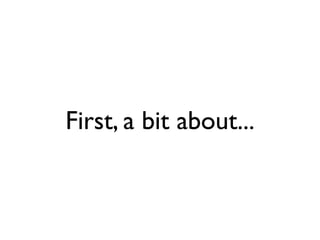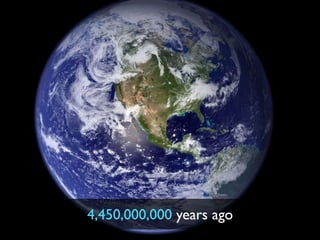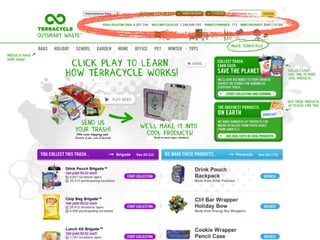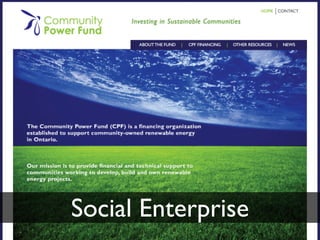Social Entrepreneurship?
- 1. social entrepreneurship? 16th Annual Environmental Sciences Symposium University of Guelph January 16th, 2010
- 2. First, a bit about...
- 3. me
- 4. unschooler
- 5. runner
- 6. entrepreneur
- 8. Let’s start at the beginning...
- 12. 7,300 years ago - Agriculture
- 13. 150 years ago - Industrial Revolution
- 15. 1945 - Hiroshima
- 17. 1983 - Exxon Valdez Spill
- 18. 1994 - Rwanda
- 19. 2000 - Aral Sea dies
- 20. We thought we were in control.
- 21. 2001 - 911
- 22. 2006 - Climate Change
- 23. 2008 - Global markets collapse
- 24. We were wrong.
- 25. “A flaw in the model... ...that defines how the world works.”
- 26. WE
- 27. ...are making our planet inhospitable.
- 28. We are killing each other.
- 29. We are killing ourselves.
- 30. We’re screwed.
- 32. If we created this mess...
- 33. ... then we can create something better.
- 35. social entrepreneurship = creating a better world
- 42. it happens a many levels
- 43. social benefit social impact systems change
- 44. Social Benefit
- 45. Social Impact
- 46. Systems Change
- 47. it happens a many forms
- 48. Social Social Non-profit Purpose For-profit Enterprise Business
- 51. ?
- 52. it’s easier than ever before
- 53. increasing instability + culture of change + communities of support
- 54. it all starts with people
- 56. Tzeporah Berman
- 57. Tom Szaky
- 58. you
- 59. what are you waiting for? Michael Lewkowitz, Igniter michael@igniter.com http://igniter.com twitter etc. “Igniter”
Editor's Notes
- The program began in 1974, when Yunus lent $27 to a group of poor villagers and realized that even small amounts could make transformative differences. He set up the Grameen Bank, which has since disbursed about $6 billion in tiny loans to about 7.4 million Bangladeshi micro-entrepreneurs, mostly women in businesses such as street vending and farming. 2007 Profit 1.56M Cumulative Disbursements $6.685B Members 7.41M No. Villages Covered 80,678 Employees 25,283 No. Branches 2,481
- About ForestEthics ­Founded in 2000, ForestEthics is a nonprofit environmental organization with staff and board members in Canada and the United States. Our mission is to protect Endangered Forests and wild places, wildlife, and human well-being. Climate change, which threatens to undermine all of our conservation efforts, is also one of our campaign focus areas. We catalyze environmental leadership among industry, governments and communities by running hard-hitting and highly effective campaigns that leverage public dialogue and pressure to achieve our goals. Our current campaigns focus on wild places in Canada and California’s Sierra, and on industries that use products that come from these places. Our efforts have transformed the environmental practices of Fortune 500 companies including Dell, Staples, Office Depot, Victoria’s Secret, Williams-Sonoma, and many others. In 2008, we launched two major new initiatives. Do Not Mail calls for a national registry in the US to stop junk mail (in 2005, 12.3 billion pounds of junk mail were produced, meaning 100 million trees were cut to feed this wasteful industry). We are also fighting climate change by stopping further development of Canada’s Tar Sands, the single largest and most destructive fossil fuel project in the world. Our approach to environmental change begins on the ground where we have staff members who live in the places we are fighting to protect and work with scientists to define critical regions. We also work with communities in the places we protect to make sure their interests are represented--and that they receive funding to implement a viable, sustainable economy. When we find that wild places and forests are being destroyed, we determine which corporations are purchasing the products of that destruction, i.e., the wood and paper being produced. If a corporation refuses to change its practices, we hold that company publicly accountable--with protests, websites, email campaigns, national advertisements, and more. And when corporations are ready to protect forests and wild places, we help them implement sound policies through our Market Solutions. Either way, the end result is that we turn our corporate adversaries into allies. And while companies like Sierra Pacific Industries and Royal Dutch Shell may be able to tune out the protests of environmental groups, they can’t ignore their largest customers—the corporations we work with—when they demand environmental reform.   Whether it’s by brokering agreements with companies or by negotiating legislated protection, our job is to protect forests and wild places for the people and wildlife that depend upon them. To date, ForestEthics has secured the protection of more than 65 million acres (25 million hectares) of Endangered Forests.
- People Collecting Trash: 8,201,144 Waste Units Collected: 1,284,646,165 Products From Waste: 113 Money for Charity: $441,741.04



























































